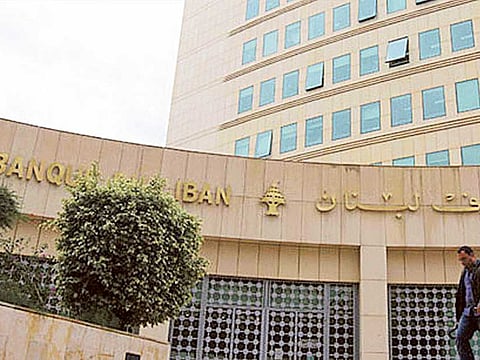Lebanese central bank’s accumulated losses reach $49 billion, says report
Lebanon is battling a financial crisis, the biggest since civil war

Dubai: The International Monetary Fund (IMF) has warned Lebanon that its central bank has accumulated losses of as much as $49 billion, as divisions between the government and the Banque du Liban threaten to derail vital bailout talks with the multilateral lender, Financial Times (FT) reported.
The BDL does not publish profit and loss accounts. In recent years, it has used a complex series of sovereign debt and currency swaps with local lenders — what the central bank governor has called “financial engineering” — to shore up the banking sector, attract foreign currency and stabilise the Lebanese pound, which is pegged to the US dollar.
That activity, combined with the impact of Lebanon’s default in March on the bank’s sovereign bondholdings and a collapse in the value of the currency, has resulted in accumulated losses of about L£170tn ($49bn), the IMF has told the finance minister and central bank governor, FT said quoting people familiar with the matter.
Those losses equate to 91 per cent of Lebanon’s total economic output in 2019, according to World Bank figures, and are almost equal to the total of value of the deposits held by the Banque du Liban from the country’s commercial banks.
While the IMF’s assessment is broadly accepted by prime minister Hassan Diab’s government, the central bank and some members of parliament argue that the BDL’s losses are substantially lower, the FT report said.
The disagreement, which has pitched Diab and the IMF against the country’s long-serving central bank governor, Riad Salame is threatening to block the emergency financing Lebanon needs to stabilise its free-falling economy, the FT report said.
More unity needed
The IMF Managing Director Kristalina Georgieva said on Friday she does not yet have reason to see a breakthrough in negotiations with Lebanon to help resolve the country’s economic crisis.
Georgieva told a Reuters Newsmaker webcast event that IMF officials continue to work with Lebanon, but it is unclear whether the country’s leaders, stakeholders and society can unify around reforms needed to stabilize its economy and return it to a growth path.
Lebanon is battling a financial crisis regarded as the biggest threat to the country since its 1975-1990 civil war, with the Lebanese pound losing 75% of its value since October.
Hopes for a quick rescue deal with the IMF have been complicated by a dispute between the government and central bank over the scale of losses in the banking system. Concerns persist, meanwhile, over Prime Minister Hassan Diab’s commitment to reforms.
“The core of the issue is whether there can be a unity of purpose in the country that can then carry forward a set of very tough but necessary measures,” Georgieva said. “All I can say is that we are putting our best people to work with Lebanon, but we do not yet have a reason to say there is a breakthrough.” Georgieva said Lebanon’s situation “breaks my heart” because the country has a strong entrepreneurial culture and has taken in Palestinian and Syrian refugees, helping to ease a major humanitarian crisis.
Sign up for the Daily Briefing
Get the latest news and updates straight to your inbox








